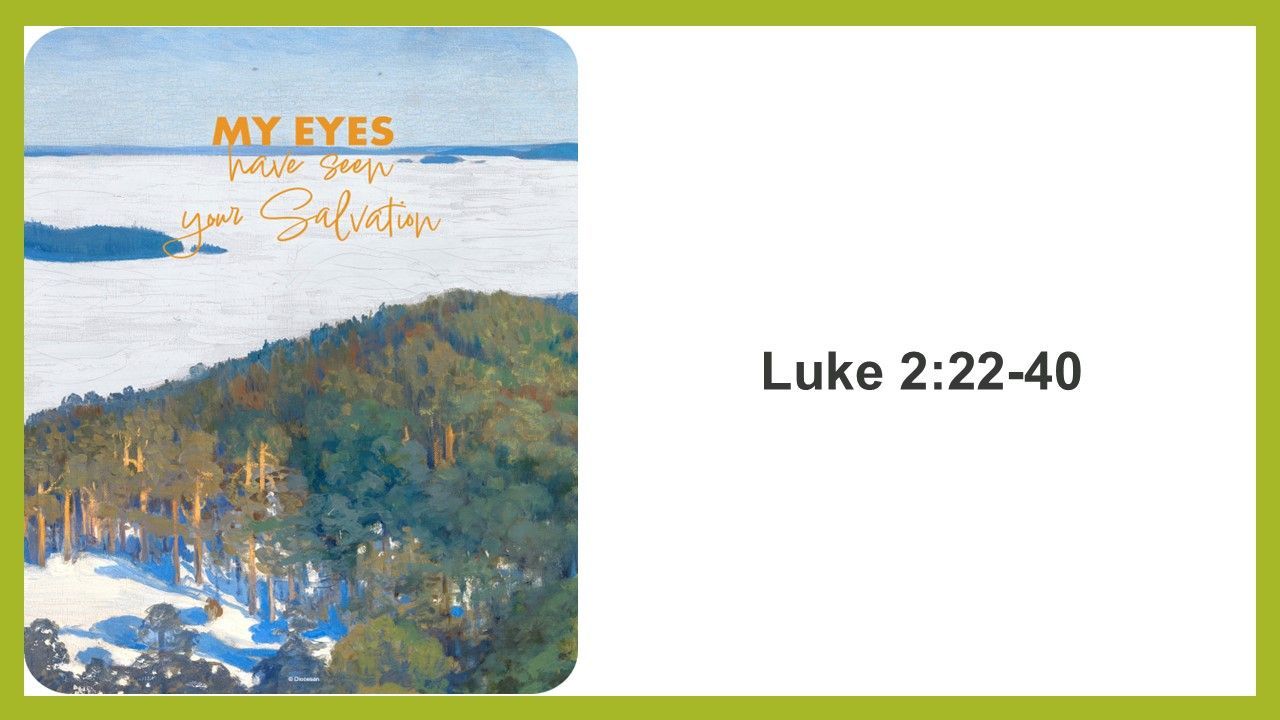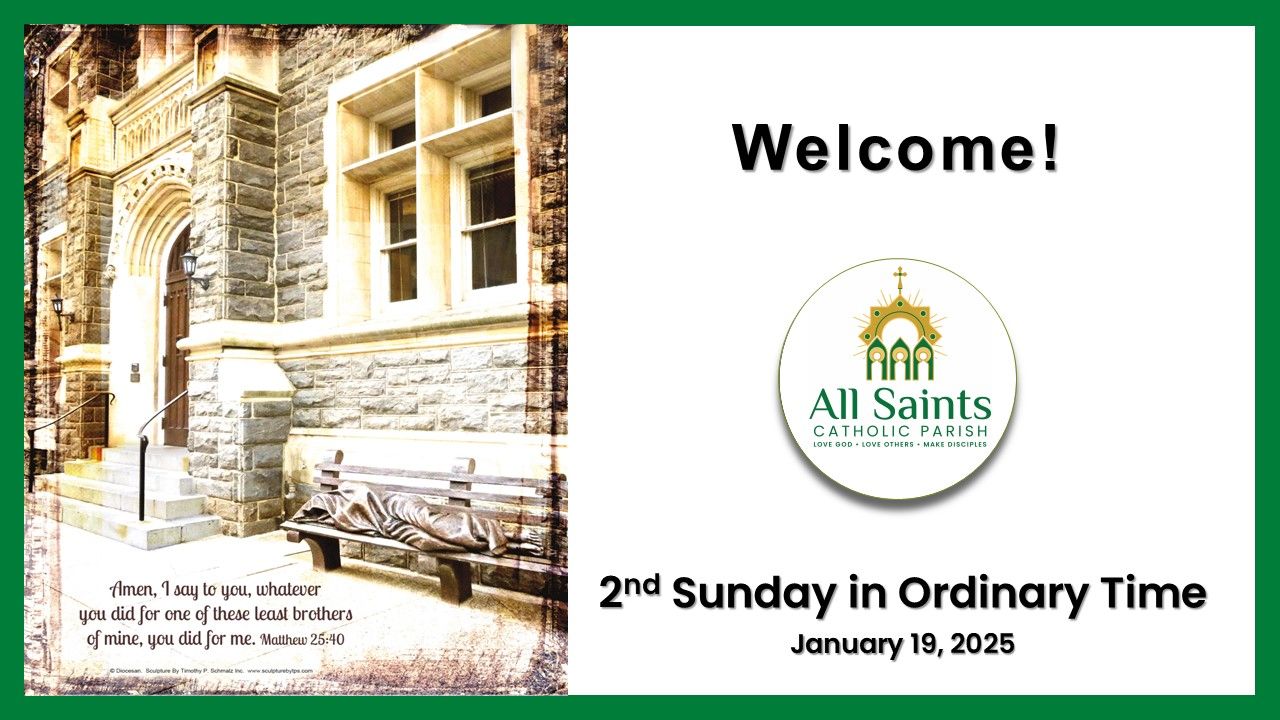Homily - The Presentation of the Lord
Homily - The Presentation of the Lord - February 2, 2025

Third Sunday of Year C
Nehemiah 8:2-6,8-10; 1 Corinthians 12:12-30; Luke 1:1-4,4:14-21
As we know, in educational circles and the corporate world, the issue of vision and mission invariably comes up. Managers and personnel always review or restate their goals and purposes. Mission and vision are standard and critical elements of any company's organizational strategy. They relate to the purpose and aspirations of an organization. On this third Sunday of the year, among other themes, the readings help us to look at our mission as God’s people and disciples of Jesus Christ.
Today’s first reading from the Book of Nehemiah talks about the reconstitution of the Jewish community after the Exile. It describes the story of new beginnings of a community full of hope, even though great difficulties still loomed ahead. The people had lost the connections to their faith. Ezra and Nehemiah were commissioned by the Lord to teach what had been lost, to rebuild the communal structures and inspire the people once again to the high ideals of their Jewish faith- in a way it was a ceremony of recommitment. Ezra, a priest and Nehemiah a governor worked together to effectively accomplish God’s tasks. In life, we do need each other to achieve great things.
And in today’s second reading, St Paul’s continues to call for unity among the Corinthians. Corinth was a large wealthy city that boasted of a population rich in ethnic and religious diversity. Unfortunately, for the Corinthian community this diversity had worked against them. Individuals and groups were integrating differing views and prayer forms into their understanding of Christianity. Paul reminds his people that they were all baptized into the very same Spirit that guided Jesus and their unity in the Spirit outranked any distinctions among them. As members of Christ, they were to consecrate their gifts and talents for the good of the community.
In this text, St Paul gives us one of the great images of the Church as a body. The Church as the “Body of Christ” is one of the three great images of the Church along with the “People of God” and “Temple of the Holy Spirit”. Just as a body has many parts, so does the Church. The body, for its best functioning, needs all the parts to interact. In the Church, we need all parts to function well. Each of us has unique gifts to bring to the Church and carry out different roles. We are so blessed to have various ministries here at All Saints. And with our different gifts and talents, we build the kingdom of God.
Describing the Catholic Church, James Joyce, an Irish writer and poet, once said, “Here comes everybody.” What an apt description! Here comes everybody.
Here comes Peter, the denier. Here comes Thomas, the doubter. Here comes Judas, the betrayer.
Here comes Augustine, a converted pagan. Here comes Ignatius, a soldier. Thomas Aquinas, a philosopher. Here comes Paul, a tentmaker.
Here comes the outspoken Catherine of Sienna and the quiet Therese of Lisieux.
Here comes Francis, preaching to the birds and Claire, dancing in the fields.
Here comes Francis Xavier Cabrini, Elizabeth Ann Seaton, John Neuman.
We are all that and even more.
We are that soldier on deployment praying the rosary, we are the teenager who walked the March for Life this week.
We are the Knights of Columbus and Catholic Daughters of America. We are the members of Grief Share, Moms’ Group, Prayer group, Wednesday in the Word.
We are the catechists, extraordinary minsters of Holy Communion, readers, ushers, greeters and children in faith formation.
We are the members of the choir and those who assist with our outreach efforts.
We are young and old. We are saints and sinners. Yet, we are – the Body of Christ. Not perfect and not whole. Broken and bruised. In need of healing and in need of grace. Yet, we are – the Body of Christ.
Like a stained-glass window. We are those different glasses. Some are blue, some are green, some are yellow, some are gold. Some are big, some are small. When we bring our faces close to the stained glass window, we can admire the beauty of each glass, the way it’s cut colored, and shaped. But as we step back from it, we can see that all these different glasses, all these different colors and shapes reveal to us another beautiful picture, a more complete picture, telling a story none of these different stained glasses can tell by itself. That is what being the body of Christ is about. That is what our life in a community is about.
Each of us is like a little glass with a different shape and color, yet a little piece of a magnificent work of art. No one can really say, “You are different. You do not belong. I do not need you. I alone make God visible” – No – only together, as everybody, do we reveal the body of Christ, the face of God to the world. No one person can “do it all” in life -whether in family life or parish. And God does not ask us to do it all. He simply asks us to share the gifts and talents we have in the season of life we find ourselves right now. Then, those who see us –as members of All Saints Parish, will be able say to say: “They make God visible.” That is what being the body of Christ is about!
Homilies












